- Home
- Sandra Chastain
Adam’s Outlaw Page 14
Adam’s Outlaw Read online
Page 14
The pressures of his kind of job played havoc with a woman’s mind. He’d seen too many of his men let their problems at home mess up their ability to carry out their jobs. He’d also seen the job screw up a man’s mind so much, he couldn’t go home at night and be a husband and father. Maybe Toni’s way of looking at what had happened was better.
“Cosmo would say that it isn’t terribly unusual for a woman to become attracted to a police officer. We represent both security and danger. The combination often becomes an aphrodisiac to a woman and a man when they’re forced together, particularly when the two people are complete opposites. A sexual attraction isn’t unusual under the circumstances.”
A sexual attraction? Toni thought. Was that the way Adam saw their lovemaking? Her courage left her. “I see. What you’re saying is that we’re complete opposites, that this relationship is purely sexual and should be considered temporary?”
“Something like that, I guess.” Though he agreed verbally, his arm tightened protectively around her, and his fingers worked their way between their bodies until he could cup her breast. What he was saying wasn’t what he was feeling.
Toni felt the trembling in Adam’s touch. She also felt him harden again, pressing against her in a protest that spoke louder than his words. Adam wasn’t a man of impulses. He never went off on tangents or acted on the spur of the moment, no matter what he’d have her believe. He was a man of action, yet he was silent. Perhaps what was happening between them was as difficult for him to acknowledge as it was for her. He might think this was purely sexual attraction, but she knew better. Jack and Jill went up the hill and they were going to stay there.
“I think you’d better guess again, Kojak,” she whispered, and raised herself up. “I don’t believe that line of malarkey for one minute.” Lowering herself slowly, she found the right place for both her lips and her hips. As Adam slid inside her he didn’t argue with her choices.
For the next few days Adam refused to admit his growing feelings for Toni. He knew she was on a hopeless mission in looking for a renovation site, but she had to find that out for herself. Reluctantly he left her in the care of Fred and Annie during the day while he tried to find out who had left the chicken as a warning.
Once he saw a man standing in the woods beyond the clearing around Toni’s house. A search of the area didn’t turn up anybody, and he decided the man was one of the neighbors and not an intruder.
Burns hadn’t been able to positively identify the man in the mug book, but the art department had come up with a composite sketch of what he looked like.
Other than the old prison farm, there were several other pieces of land and houses bordering the proposed Olympic complex site. The first few owners Adam contacted refused to admit they’d been approached by anybody with any strong-arm tactics. Late one afternoon he paid a visit on an old woman who operated a one-room grocery store in the front half of her house. The old woman was E.T.’s mother. Once she learned Adam was the officer who’d gotten her son out of jail, she didn’t hold back.
“Sure,” she said, letting a stream of tobacco juice fly past his trouser leg to the ground. “A man come by here with a pocketful of money, awanting to buy my little house.”
“Did you sell?”
“Funny thing about that. Told him it didn’t belong to me. I just rent it, like my mama before me. But he offered me a nice piece of change to buy my … lease, I think he called it. He said they was going to sell this building and tear it down anyway. But I could stay right here until they got ready to do it. Then he’d move me into one of those high rises. He weren’t pulling my leg, was he?”
“No,” Adam reassured her. “I’m sure he wasn’t. Did you sign anything?”
“Yes, sir, we signed a paper. Got it right in there in my cash register.”
She let him see the agreement. The signature was that of a man he recognized, a maverick developer who’d been in trouble with the city for not living up to his minority-contracts agreements. Just last month the city had dropped his firm from the list of accepted bidders on city projects. Adam was beginning to understand what was happening. There was no reason to say anything, though, until he’d made more inquiries.
For the next three days, Adam followed a paper trail of sales options, each with a different signature. All the sellers identified the sketch Burns had provided as being the man they’d sold to.
Reporting to the mayor, Adam voiced his frustration. “Of course there was no secret that we were going after the Olympic games. Everybody knew the site would be in this area because the city already owns the land, so it’s no surprise that somebody’s buying options on the outlying properties. If somebody wanted to put up the bucks, there’s nothing illegal about that.”
“But why?” the mayor asked. “If the Olympics fall through, they’re stuck with options on land that isn’t desirable.”
“Yes, but remember the zoning change. From low-rent housing to commercial doubles the value instantly. The culprit is willing to gamble that the Olympics will push the price up even more. Besides, even if they lose on the games, they’ve got their options cheap before the zoning change becomes public knowledge.”
“Still, the only real problem we have here, Adam, is the attempted bribery. And now we know who is behind that. Burns will have to testify. He’ll probably get off, but the developer and his henchman will be prosecuted.”
“At least, sooner or later there’ll be housing built instead of factories,” Adam said, thinking how pleased Toni would be.
Warrants were sworn out for the arrest of the developer and the associate who had attempted the payoff. At the same time a strong statement was issued that Toni Gresham wasn’t the only witness to his wrongdoings. The property owners were also able to identify the perpetrator.
Later that night as Adam and Toni lay in bed, he told her the truth. “Secretly, for months, the developer has been buying up options on the property, expecting the Olympic site committee to approve Atlanta for the 1996 Summer Games. If the zoning change is approved, he holds the options on the land around the complex, with little initial outlay of cash.”
“What will happen to all those people who gave him an option on their property if the Olympic committee chooses another site?”
“The mayor thinks the developer would let the options drop and the property owners would get to keep the advances.”
“Either way, Burns will get off scot-free,” Toni said in disgust.
“Looks like it. That’s the way it goes sometimes, sweetheart. You win some and you lose some. At least we stand a good chance of getting the summer games here.” He planted a satisfied kiss on her lips. She didn’t respond.
“What’s wrong, outlaw?”
“The system, that’s what. The city makes a lot of money from the tourists. Burns doesn’t get punished. I lose the prison farm. The Swan Gardens people lose a possible home, all because of something that may not even happen.”
“But Toni, face it. You could never have turned the prison farm into a good place to live anyway. Helping people one-on-one is fine, but be realistic. You can’t take on a whole housing project. That’s misleading those tenants just as much as the developer was misleading the property owners by not telling them about the zoning change. Your plan was unrealistic and it’s over, Toni. Let’s put it behind us.”
“Unrealistic? What you mean is, stop trying to do something that seems impossible. Not by the hair of your chinny, chin chin, Adam Ware.” She sprang to her feet. She couldn’t give up on this, as her parents had done on the mill after her grandfather died. “You’re just like everybody else, willing to think small. You don’t even begin to understand what I want to accomplish. But you’re right about its being over. I’m out of danger now, aren’t I?”
Adam had a bad feeling about what was happening. “Yes, you are. They have the man who left the chicken in your sink in custody. Why?”
“Then put on your pants and go home, Kojak. I’ve worked too h
ard for too long to give up now. If you don’t feel the same way I do, then hit the road, Jack.”
“You mean those Swan Gardens people are more important than us?”
No, she wanted to say, but the truth was that Adam didn’t love her. “I guess,” she said slowly, “there isn’t any us, Adam.”
She was ending it. Adam was speechless at first, then angry. Surely he was more important to Toni than this. But one look at her face and that hope died instantly. She was serious. She was telling him to go. He pushed back the sheet and stood, staring at her in disbelief.
“Why, Toni?”
“Because I have to. This isn’t some little project that didn’t work out. This is what I do, Adam. It’s important to me. Can’t you understand? I need to do this. I need to.”
He pulled on his underwear and pants, tucked his shirt in, and jabbed his feet into his shoes. “No, I don’t. I’m in love with you, Toni Gresham, and what you need is me. I loved my father, too, but he was always gone, taking care of business. He never had time for me and one day he didn’t come home again. Sooner or later, if you find time for me among all those people who are so important to you, well, you know where I am.”
Toni was stunned. He’d said the words she wanted to hear. Adam had said he loved her and he was walking out. She grabbed the sheet and wrapped it around her as she followed him, stumbling when her feet tangled in wads of cloth.
“Adam, wait.”
“And another thing,” he called over his shoulder. “You might just want to ask those Swan Gardens people what they want, instead of satisfying your own ego without asking.”
Then he was gone and her teacup was silent. The magic was gone. The steel columns began to creak and groan and Toni shivered in the darkness.
What was wrong with him? He of all people ought to understand what she was trying to do. She wasn’t going to leave him. She wasn’t like his father. But he couldn’t be sure of that, could he? Toni sighed. They were both fighting their pasts. Her family hadn’t been bad guys as she’d always thought. They hadn’t had a choice in closing the mill. And they might be interested in helping if she opened up and gave them a chance. Adam needed her. He needed her to show him that they could make a real difference—together. And she needed him because … because …
“Oh, damn,” she muttered.
But somebody had to take a stand. Why was it that she understood and Adam didn’t? As for asking the Swan Gardens people what they wanted, she didn’t need to do that, did she?
The next morning brought her answer. At a hastily called meeting for the tenants, she heard their hesitant answers. They wanted trees and gardens and a park, maybe a place to raise some flowers and vegetables, somewhere away from downtown. In truth, the old prison farm was a bad idea.
“Why didn’t you say anything?” she asked in a choked voice.
“We didn’t want to hurt your feelings, Toni,” Willie Benson answered. “It seemed to be so important to you and you’ve been good to us.”
“To me? But everything I’ve done has been for you, not me. I’m so sorry, gang. I don’t know what to do now.”
“Why not ask Adam, Toni?” someone said hesitantly. “He seems like a levelheaded young man.”
“I see.” Levelheaded was what they wanted, not someone impetuous like her. Adam would never have commandeered the prison farm. He would never have decided to renovate it and move a group of old people in without consulting them about the move. But she had.
The tenants tried to console her by explaining that they’d never expected her to perform the miracle anyway. They’d already begun to make plans to move.
“Little Boy Blue, come blow your horn,” she muttered miserably under her breath as Fred drove her to the old thread mill to pick up her car. She left him to take stock of the supplies they stored in one of the old buildings and went back to her house.
Adam had been right about her all along. She’d gone charging off to save the world without asking the world whether or not it wanted to be saved. She’d studied engineering in order to build buildings. She taught in the vocational system to train people to earn a living. She gathered her own little band of admirers around her so that she could do great good without ever examining her motives. Could she have been wrong?
No, the goals weren’t wrong, but maybe her methods had been. She’d failed miserably and in the process she’d lost Adam. For the first time since she was a very little girl, Toni wanted a shoulder to cry on. She wanted her mother’s shoulder to cry on. She hit the brakes, turned her car around, and headed for Riverside Drive. She didn’t know what would happen, and she’d never done it before, but she was going to ask her mother for some advice.
“The king is in his counting house, counting out his money.” The king and money, that was it! Money and prestige had ruined her project, and money and prestige would have to fix it. After all, the good ole boys always took care of their own, and her father belonged to that club. For the first time in her life, she’d asked for his help too.
Ten
But it wasn’t her father Toni went to first when she rushed into her parents’ house.
“Mother?” Toni raced up the stairs, knocked on her mother’s door, and burst inside. “Mother, I need to talk to you.”
Mrs. Gresham looked up at Toni, her expression puzzled. “Is there something wrong, dear?”
“Yes, there is, Mother. I need … I need to talk to you.” Her voice was choked by a lump in her throat the size of a goose egg.
“You do?” Alice Gresham stared in astonishment for a long moment, then quickly rose and took her daughter into her arms. “I mean, you really need me?”
There was a pleasure in her voice that couldn’t be disguised. “I’m here, darling. What can I do?”
By that time Toni was forcing back the threat of tears, hating herself for the display of weakness. Yet she knew, even as she and her mother sank down onto the satin-covered bed, that her tears were cleansing. “I’ve lost him, Mother. And I don’t know what to do.”
“You mean Adam?” Mrs. Gresham let Toni sob until she seemed to grow calm, then reached into her pocket and pulled out a small embroidered handkerchief. “I very much doubt that. Now, blow your nose and tell me what happened.”
Toni took a deep breath and followed her mother’s instructions. Alice Gresham didn’t sound stern. Rather, she seemed genuinely concerned. Toni lifted her head and gazed at her mother. There was a shy, hesitant look in her mother’s eyes that suggested she didn’t know quite how to proceed.
“Oh, Mother, I’ve ruined your blouse.”
“Who cares about the blouse? Toni, you’re what’s important.”
And suddenly, as Toni told her mother what had happened, the walls came tumbling down, walls built higher every year without either mother or daughter knowing how to stop it.
“And you were really going to spend the night in that awful place?”
“I thought I was.”
“And Councilman Burns was taking a bribe to change the zoning ordinance? Our friend Richard Burns?”
“I’m sorry, Mother, but he was.”
“Well, I never did like him. He always ate all the shrimp. Now he’s ruined your plan and you haven’t been able to find another building. He certainly ought to be punished. Let’s call your father up here. He’ll bring it up before the country club committee.”
“Mother.” Toni laughed in spite of her pain. “You’re wonderful. But that isn’t the worst thing.” She lowered her eyes as she tried to find the words to tell her mother the truth. “I’ve been so busy with the Swan Gardens people that I … lost Adam.”
“Now, darling, from what I saw at lunch that day, I doubt that it would be that easy for you to lose Adam. Maybe you just misplaced him a bit.”
“It isn’t just that I didn’t make time for him. I refused to look at any other way of doing things. I ignored him, just like his father did. That’s the way I am. I get my mind set on something and I don’t listen.
I didn’t even ask the Swan Gardens people what they wanted. Not me. Toni Gresham, Robin Hood to the world, just charged ahead with her blinders on.”
“Oh, darling,” Alice Gresham said with a sigh, “that’s so easy to do. Believe me, I know. I let it happen between us. I closed my eyes. When your grandfather filled your head with dreams and high ideals, I never said a word. I never wanted to face you with the truth.”
“What truth, Mother? Grandfather was the most wonderful man I ever knew.”
“Yes, he was, and no, he wasn’t.” Alice stood and walked over to the window. “Your grandfather was a sweet, dear, totally unrealistic man. He borrowed money from your trust fund, sold off family assets, all to hide what was happening. Instead of accepting the truth about the mill and changing the way he’d always done business, he simply continued to operate as he always had. He paid people that he didn’t need to make thread and yarn that nobody wanted to buy.
“In short, Toni, the mill lost money for years, but he refused to believe it. Finally, when he died, we found out there was nothing left but debt. We had to sell off part of the mill to pay the bills. There wasn’t enough left to modernize and compete. That’s why the mill was closed down.”
“I never knew. I thought it was you and father, that you sold the mill and caused all those poor people to lose their jobs because you didn’t want to carry on Grandfather’s business.”
“You blamed your father and me?” Alice was shocked. “I knew that you changed, but we thought it was because of your grandfather’s death. You two were so close. You adored your grandfather and we decided not to disillusion you. You were just a child.”
This time it was Toni who held out her arms and comforted her mother. “So many years,” she whispered, “and how wrong I was.” She’d kept punishing her mother until Alice had become distant and cold.
“Well, Toni,” her mother finally said, “maybe it isn’t too late. Let’s see what can be done to solve your problem.”
By midafternoon, with her parents’ help, Toni had come up with a solution and offered her plan to the tenants. By late afternoon, they’d enthusiastically agreed to her idea and insisted they be allowed to participate as well. The man with the missing finger was one of four former carpenters who lived in the Gardens. An electrician and a plumber were also among the renters, and they volunteered. They were retired, but they weren’t completely useless.

 The Redhead and the Preacher: A Loveswept Historical Romance
The Redhead and the Preacher: A Loveswept Historical Romance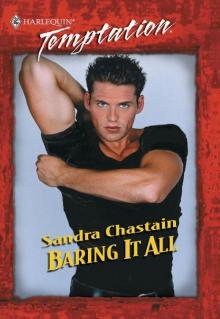 Baring It All (Mills & Boon Temptation)
Baring It All (Mills & Boon Temptation)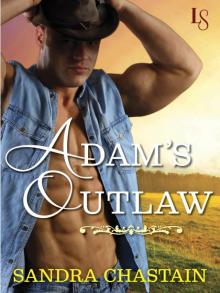 Adam’s Outlaw
Adam’s Outlaw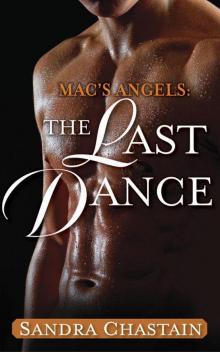 Mac's Angels: The Last Dance: A Loveswept Classic Romance
Mac's Angels: The Last Dance: A Loveswept Classic Romance Imaginary Lover
Imaginary Lover The Judge and the Gypsy
The Judge and the Gypsy Silver Bracelets: A Loveswept Contemporary Classic Romance
Silver Bracelets: A Loveswept Contemporary Classic Romance Penthouse Suite
Penthouse Suite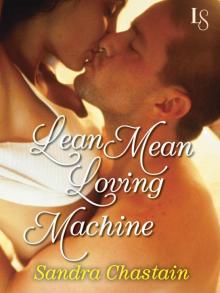 Lean Mean Loving Machine: A Loveswept Classic Romance
Lean Mean Loving Machine: A Loveswept Classic Romance Joker's Wild
Joker's Wild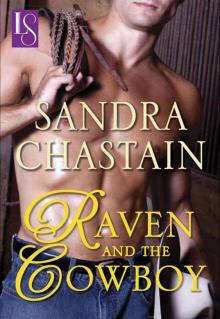 Raven and the Cowboy: A Loveswept Historical Romance
Raven and the Cowboy: A Loveswept Historical Romance Night Dreams
Night Dreams The Outlaw Bride
The Outlaw Bride Scarlet Butterfly
Scarlet Butterfly Mac's Angels
Mac's Angels Run Wild With Me
Run Wild With Me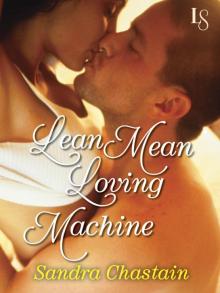 Lean Mean Loving Machine
Lean Mean Loving Machine